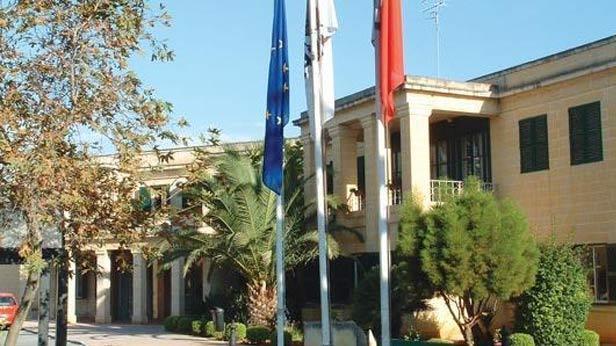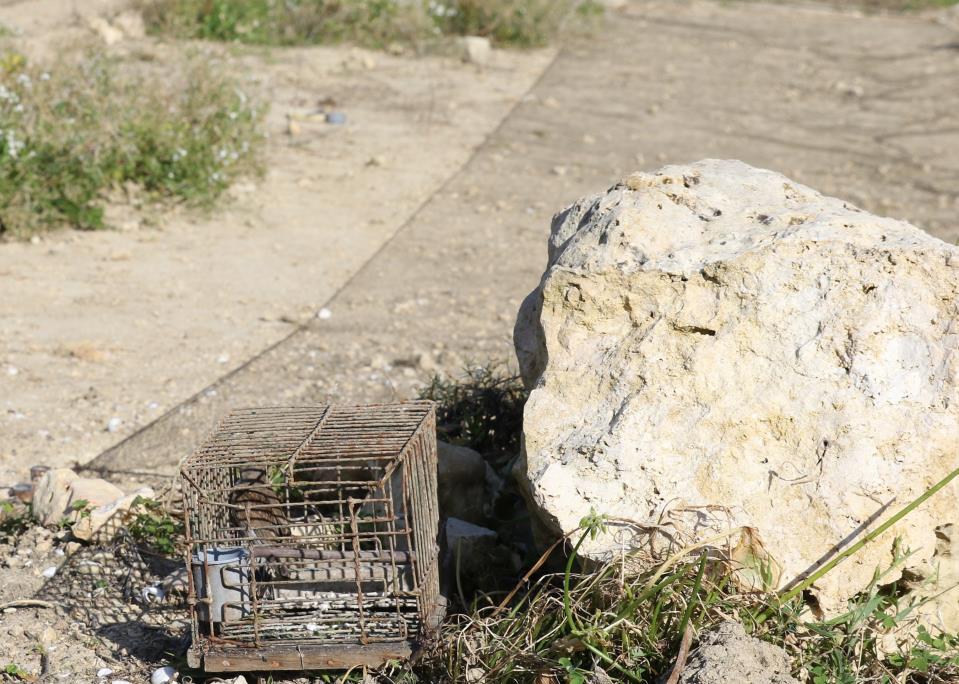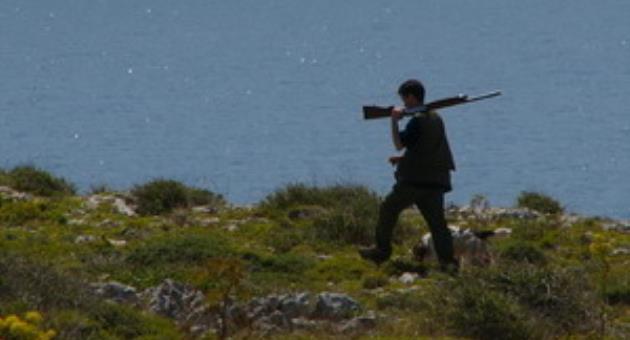A report commissioned by the Environment Ministry published in August 2016 found that the infamous sea sludge came mainly from the fish farms. This resulted in the Planning Authority's removal of six illegal cages in the St Paul's Bay area the following October. However, in recent weeks sea slime has reappeared in a number of bays around Malta. Do you believe that the measures taken were sufficient?
First of all, the measures taken have not yet been completed. The issue has affected Malta for a number of years and I decided to take the bull by the horns. I started by holding a number of informal meeting with representatives from the Environment and Resources Authority, the Planning Authority, and the Department of Aquaculture to examine the state of play.
I then needed to be convinced that that the sludge was emanating from the fish farms, which the report and I confirmed was the case. The report found that the fish farms were operating illegally. There was no coordination between the regulator (the Department of Aquaculture) and the PA, in the sense that the department mainly checked to see if there was the right number of fish per cage, without taking into account whether the number of cages was in accordance with planning policies.
The Ministry also carried out a study with Stirling University which recommended that the fish farms be moved to an area a number of kilometres offshore in the south of Malta. There is also an area in the north that is still being examined. We also drafted regulations with the PA, the ERA and the Department of Aquaculture which will be published very soon. The idea is to create stringent conditions and to improve coordination between the departments. Also, so as not to cause a shock to the industry, we withdrew the fish farms' licences and issued an emergency conservation order through the ERA.
In the meantime, we are coming to an agreement with all those involved to relocate the pens, should these criteria be met, and then their applications will be reconsidered favourably. We want to save the industry but we also want to protect the environment and the quality of the water. With regards to the latter incident, it must be taken into account that the cages are almost empty because the culling season is over.
The foam may not be the result of sludge from the fish farms, but could be something worse, a result of algae that produces foam. This is being examined further by the ERA which is investigating the source. Although foam occurs naturally, it rarely happens, and may be the result of rising temperatures.
When will the measures be implemented?
We have given deadlines but nothing is set in stone. The proposed deadline is before the next breeding season - which is before the end of May. We are doing our very best to adhere to that target.

Are you able to guarantee that there will not be a repeat of last summer's incidents?
Unfortunately, we live in a world of compromises; everyone lives together and we have to look to minimise. Malta is a fantastic country but it has its limitations. You have to accommodate industry, tourism, quality of life and the environment - everything. To do this is not always easy, so we have to look at minimising these inconveniences. However, I am sure that once these pens are relocated, as was recommended by experts and by Stirling University, the effects of the industry will be minimal. I cannot say that every now and then there will not be a reoccurrence. The good thing is that, even though the slime is an environmental hazard because it deters swimmers and tourism, it is not as serious as an oil spill would be, because it is organic and the effects are temporary.
There are allegations that overfishing, especially with regard to swordfish, is on the rise. Is there any truth in the claims and, if so, is the Ministry doing anything to combat it?
First of all, over the years fishing has become more and more regulated. For fishing to be sustainable, one has to fish with caution because if the stocks fall too low, the fishermen will suffer the most. It is a global problem in that fish stocks have been depleted as a result of the demands of a massive population. Having said this, for the first time, the amount of fish produced by aquaculture was the same as the amount of fish produced in the wild. We will increase enforcement, which has always been a weak area in Malta, but it is consistently being strengthened. We have good laws but I must say enforcement has not been the best or what we had hoped for. I have a team of lawyers who are working earnestly to try and consolidate all the laws concerning the environment. The regulatory authorities are investing more; and I have directed the ERA to strengthen its enforcement role. We are also revising legislation to increase penalties with a view to strengthening deterrents. However, we will always have people who will break the law; we have laws against crime but that does not mean that crime does not exist.

The government restructured the Malta Environment and Planning Authority and formed the Planning Authority and the Environment and Resources Authority. Do you think this was a good decision?
Definitely, and at this point in time even the Opposition agrees. One has to keep in mind the fact that the ERA is a new regulatory agency that was formed a year ago and has a vast jurisdiction. The first thing that it had to do was restructure itself and engage personnel. Today, it has 200 hundred employees. The government has also invested €9 million in the authority. The ERA's precursor, the Environment Protection Directorate, had but a fraction of that amount. This does not mean it is enough to embark on infrastructural projects of the Natura 2000 type. We need to tap into EU funds, as well as the assistance of eNGOs and other entities. There was trouble at the beginning, but the ERA now has powers that it did not have before: it has the right to appeal against decisions and the right to grant operational licences to fish farms and tankers.
A total of 745 developments in ODZ areas were approved by the Planning Authority in 2016 alone. There were other controversial planning decisions such as the case of The Cloisters, Sliema, which was granted a Category B+ protection status, and that development was approved with eight votes in favour and two against. One of those votes was from ERA representative Victor Axiak. Do you think there is a lack of ERA presence in planning decisions?
The ERA's remit is the environment, so it will always be overcautious and overprotective when it comes to ODZ. This does not mean that it has no role when it comes to decisions in the urban area, but it is from an environmental and not a historical perspective, so its reports will mainly focus on the environmental impact of a development. It does care about aesthetics but the environmental aspect gets prominence.
However, the ERA has voted against a number of projects, therefore implying that those projects will be harmful to the environment, yet the planning applications still go through. What would you say about these decisions?
Unfortunately, the Planning Authority is not bound by law to adhere to the advice given by the ERA when it comes planning per se. The ERA has a strong voice and it should be heard. However, this does not mean that it has the final say. When it feels strongly about something it should appeal and object. If you ask me whether or not I am happy about the ways the two authorities are coexisting, I would say 'no', because there needs to be more fine tuning.
A total of 69 per cent of recommendations from the ERA have been rejected and I want to analyse this. In fact, the Ministry has approached retired judge J.D. Camilleri to analyse why this percentage is so substantial and how the entities can best coexist. We chose him because he was the chairman of the EPD, he spent three years working there and has vast experience in this field. He definitely has the respect of both the PA and the ERA.
It could be that, in certain instances, the ERA is being over-protective, over-aggressive, and objecting to permits for something small instead of approving them and making recommendations as to how that particular alteration could be amended instead of outright rejecting. It could also be that the PA is not sensitive enough to this new entity.
To be honest with you, I was not happy with the percentage of recommendations that were being rejected, including the one you mentioned [The Cloisters]. I cannot dictate to the ERA, so it would be wrong if I imposed my influence on certain applications. However, from a political perspective it bothers me and I could not just sit around and do nothing about it, so I met with the entities and I informed them of the situation and public perception. After that, we selected Judge Camilleri to look into the state of affairs.

The CABS ornithological group recently recorded an aerial survey that revealed a record number of 133 active trapping sites concentrated in coastal areas on a single morning, despite a ban on bird trapping in the spring. Are you willing, as the Ministry, to sharply increase fines and introduce greater enforcement in the field?
Generally, Maltese law prohibits all forms of capture or trapping of any birds. However, live capturing activity by means of traditional selective clap nets is authorised through the EU Birds Directive. We have a derogation that enables us to permit a controlled form of finch trapping. Malta feels the way we are doing it is in a sustained manner and it is not really having that grave an impact on the population of the species.
Having said that, in 2014 the European Commission initiated legal procedures against Malta since it does not agree with our interpretation of the law. We have studies to back up our argument.
I am all in favour of enforcement when it comes to hunting or trapping, whether I like it or not, and you need to hear all the views and not extreme positions. We have seen massive results from enforcement on hunting and even the NGOs will tell you that.
But will you consider a steep increase in fines?
I will consider it, yes. I have to have representation on it but I will consider it and if the penalties and deterrents are not proving sufficient we will consider increasing them.
Following the spring hunting referendum, the government stepped up enforcement. The incidents of illegalities occurring were few and far between, and whenever they occurred the government intervened and closed the season. However, in the previous autumn hunting season, at least 52 protected birds were killed and there had been over 100 illegalities by 2 November, but the hunting season remained open. Why did the Ministry not intervene?
First of all, what Malta used to hunt mainly was the turtledove, but when an EU report found that turtledoves were possibly endangered, one of the first things I signed, with the hunters themselves, was a moratorium on the spring hunting of turtle doves. When it comes to enforcement, I have to state this.
The question is not about enforcement. As you said, when you needed to intervene you did, so why did the Ministry not intervene when 52 protected birds were killed in a matter of weeks?
If you had to take a collective action arbitrarily, I think you would be acting unjustly. For example, if some nightclub owners misbehave, you don't close all the nightclubs, you only do it when there is a threat in one area infringing individual rights.
It is the same thing with hunting. You can never have a situation where everyone adheres to the law. The reports we received about the number of infringements were not such that merited a moratorium or suspension of the hunting season. We do not exclude it, and we have done it in the past when over a few days everyone seemed to be misbehaving and in areas close to schools, and we were not afraid to suspend the season.
You said that the government had previously closed the season when five protected birds were shot. The season was suspended for a second time after one protected bird was shot. In the latest autumn season at least 52 protected birds killed. Do you not notice the disparity between the figures?
Yes, it is true, and these people should be punished. We have increased the punishments severely: there are prison sentences now and the fines are extremely high. But you do not punish 5,000 because 10 people have broken. The power is there; let there be no mistake - the Minister has the right, in extremis, to suspend the season. But I do not think it was the case this last autumn season because the reports seemed to indicate that the hunting community is behaving much better than in the past. As such, the government deemed such action inappropriate or exaggerated.

There is a public perception that the government turned a blind eye to illegal hunting during the last autumn season since it is nearing an election and the hunting lobby commands a large voter base. What would you say to these statements?
The action taken was not because we are close to an election, but every government is sensitive to its electorate, its constituents and the Maltese people at large. Therefore as I told you before, a government has to strive to be in the middle and to be mainstream in everything it does, otherwise it will create backlashes. Also the government, which is democratically elected, must be sensitive to the electorate. I do not think it is a bad thing for the government to do this, since it is there by the will of the people.
This does not mean it should not take tough decisions: it has a legal obligation to do so. I would not mind losing the election if I can leave behind a legacy. There have been Prime Ministers and ministers who have lasted a few years and who left a mark, and there are others who were there much longer and did not. This does not mean that once you are elected, you ignore the people who elected you. Everything must be taken in a proportionate manner.
The statistics show that, at the very least, there are some serious issues regarding enforcement, with both CABS and BirdLife claiming that enforcement is poor, particularly in Gozo. Do you believe that there needs should be a re-evaluation of the current enforcement?
Gozo suffers from a double insular mentality, and the attitudes of the people there are bit different from the ones over here. That Gozo traditionally suffers with enforcement is a fact, I remember when my father was a sitting magistrate for Gozo, he used to tell us that he could never conclude cases in the criminal field because nobody would give evidence against somebody else - omertà. That is the mentality, it is laissez-faire. What I think needs to be done is to strengthen the educational aspect in this regards, and perhaps greater enforcement.
And in Malta?
I'm not going to lie. In Malta our enforcement is not up to mark, I've said this publicly, and it is definitely not. It is easy for a person like me to introduce this? No, but I'm trying to do so. I'm trying to change and reconcile the laws, I am giving directives to my regulatory authority. You do it by strengthening the laws, and strengthening enforcement. The most important thing is to get the message across. There are other countries that have less enforcement but the people abide by the laws. If you take people of northern Europe, for example, they are more disciplined when compared to those of the south. Unfortunately, that is a fact.
The environment was one of the cornerstones of the current administration's successful electoral campaign. Do you feel that the government has delivered?
I am happy to quote a recent survey regarding the public's concerns about the government, which found that, under my watch, concern for the environment has fallen by six points to three per cent. For me, this is a clear indication that the visibility I am trying to create is bearing fruit. It is no small feat to have achieved this.
Secondly, sometimes people unfortunately jumble up planning matters with environmental issues. I'll admit that, but maybe it is not my fault completely. We have done so much for the environment; for example, we have declared 13.5 per cent of land in Malta as Natura 2000 sites, we have issued the management plans of conservation orders, I have announced a new nature reserve, I am embarking on afforestation projects, there are so many infrastructural projects and we are further increasing protected sites and species. It is mindboggling what huge investments are being made.
But other issues, like planning matters, which are not under the remit of the Environment Ministry, are being mixed up with our remit and while we need to look at the holistic criticism, it does annoy me.
What I want to see over the coming years is that the environment has improved and that it is fabulous - that is my dream. But, again, it is not easy to keep the balance between the environment and development, and sometimes people expect too much.